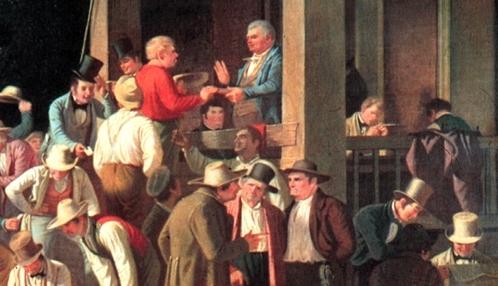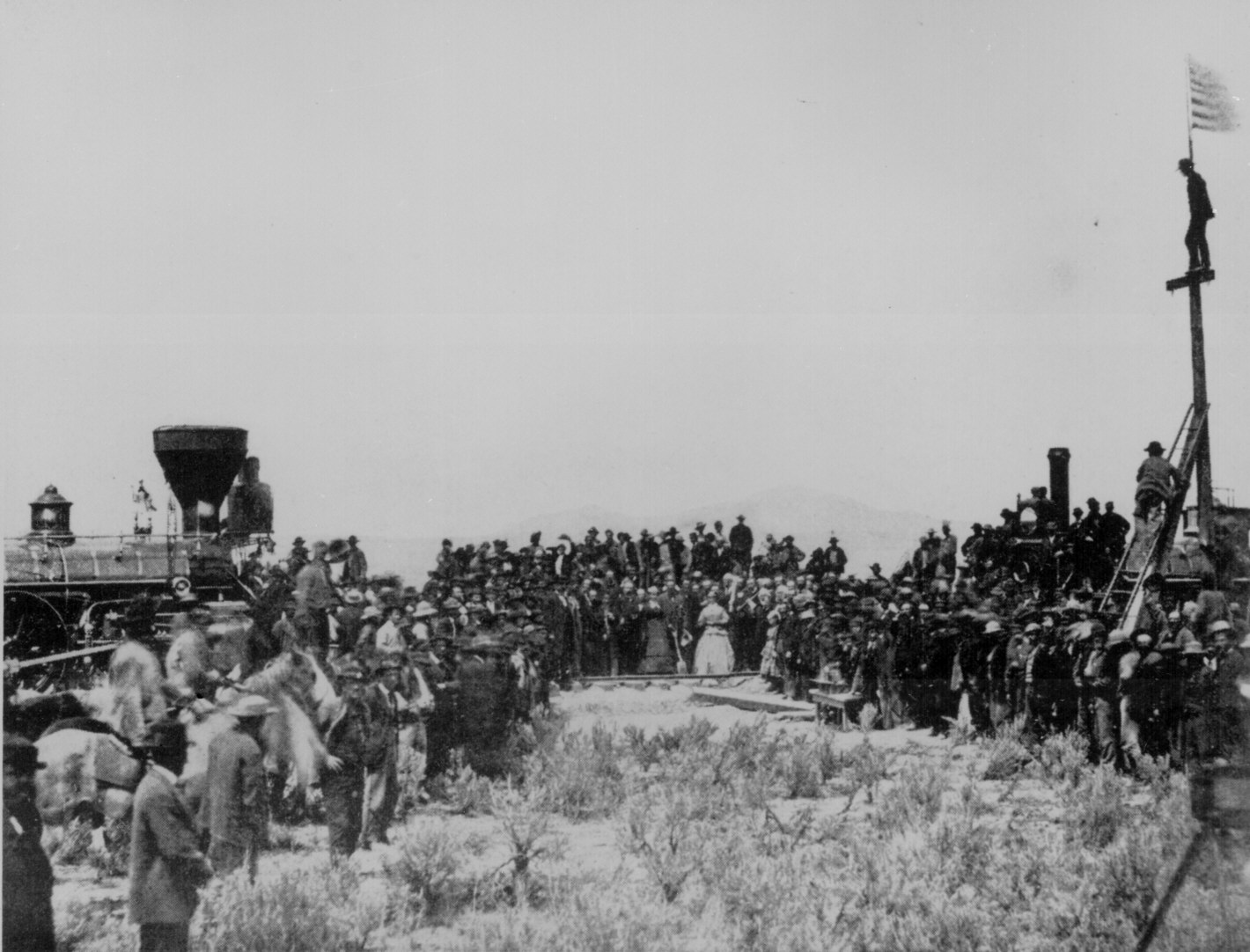|

Detail from George Caleb Bingham, "The County Election"
(1854)
|
Questions to consider
1. Account for Andrew Jackson's appeal.
2. What did the Whig party stand for?
3. Who took part in politics in this period and how and why did they
do so?
4. What was the function of political parties in American politics in
this period?
5. Why was banking such a divisive issue in American politics in the
1830s and 40s?
6. When and how did a two party system emerge?
Primary sources
1824 Election cartoon [with explanatory
notes by Daniel Peart]
A
campaign biography supporting Andrew Jackson, 1828
Witnesses to the political process
Andrew Jackson
on the Bank issue and Henry Clay on the tariff
"The Hunters from Kentucky"--Jacksonian
Campaign Song, 1828
R. McKinley Ormsby defines
the Whig personality type
John O'Sullivan, statement of principles from "The Democratic Review"
(1837)
Introductory
reading
James Morone, "The
Resistable rise of the Common Man", in The Democratic
Wish (1998)
Robert Wiebe, "Democracy", chapter 1 of Self-Rule: A Cultural
History of American Democracy (1995)
Further reading
Ideology
Lawrence
Frederick Kohl, "Republicanism Meets the Market Revolution" [Review
of Watson, Liberty
and Power] Reviews
in American History 19:2. (1991): 188-193
Richard
J. Ellis, "Competing Conceptions of Democracy", in American
political cultures (1993)
Daniel Walker Howe, The Political Culture of the American Whigs (1979),
esp. pp. 11-42
Major L. Wilson, "Liberty and Union," in Space, Time,
and Freedom: The Quest for Nationality and the Irrepressible Conflict,
1815-1861 (1974), 3-21
Lawrence Frederick Kohl, "Introduction: Politics, Society, and the Individual
in the Jacksonian Era," in The Politics of Individualism: Parties and
the American Character in the Jacksonian Era (1989)
John Ashworth "The Jacksonian as Leveller" in the Journal of American
Studies 14 ( 1980)
HerbertErshkowitz and William G. Shade, 'Consensus or Conflict? Political
Behavior in the State Legislatures during the Jacksonian Era', Journal of
American
History 58 (1971): 591-621
Douglas E.Bowers, 'From Logrolling to Corruption: The Development of Lobbying
in Pennsylvania, 1815-1861', Journal of the Early Republic 3 (Winter, 1983),
439-474
Donald B. Cole, The Presidency of Andrew Jackson (1993)
The place of
politics in society
Daniel
Feller, "Politics and Society: Toward a Jacksonian Synthesis"Journal
of the Early Republic 10 (1990): 135-161
Samuel P. Hays, "Society
and politics: politics and society", Journal of Interdisciplinary
History 15: 3 (1985): 481-499
Paul
F. Bourke and Donald DeBatts, "Restoring Politics to Political
History", Journal of Interdisciplinary History 15:3
(1985): 459-466
Lawrence
Frederick Kohl, "The Concept of Social Control and the History
of Jacksonian
America" Journal of the Early Republic 5:
1. (1985): 21-34
William E. Gienapp, ‘“Politics Seem
to Enter into Everything”: Political Culture in the North,
1840-1860’, in Maizlish, Stephen E., and Kushma, John J. (eds.), Essays
on American Antebellum Politics, 1840-1860 (1982)
Glenn C. Altschuler & Stuart Blumin, Rude Republic: Americans
and their politics in the nineteenth century (2000)
Conceptions of parties and politics
Marc
W. Kruman, "The Second American Party System and the Transformation
of Revolutionary
Republicanism", Journal of the Early Republic
12 :4 (1992): 509-537
Jean H. Baker, "A sense of party: George Bancroft, Martin Van Buren
and Samuel Cox", from Affairs of Party (1983)
Party
Period debate in Journal of American History: Ronald
P. Formisano, "The 'Party Period' Revisited", Journal
of American History 86 (1999): 93-120; Mark
Voss-Hubbard, "The 'Third Party Tradition' Reconsidered:
Third Parties and American Public Life, 1830-1900", Journal
of American History 86 (1999): 121-150; Michael
F. Holt, "The Primacy of Party Reasserted", Journal
of American History 86 (1999): 151-157
Harry S.
Watson, Liberty and Power (1990), esp. ch 2, 5-8.
Women and politics
Norma Basch, ‘Equity vs. Equality: Emerging
Concepts of Women’s Political Status in the Age of
Jackson’, Journal of the Early Republic 3
(1983), 297-318
Nancy F. Cott, The Bonds of Womanhood: “Woman’s
Sphere” in New England, 1780-1835, (1977)
Robert J. Dinkin, Before Equal Suffrage: Women
in Partisan Politics from Colonial Times to 1920 (1995)
Barbara Leslie Epstein, The Politics of Domesticity: Women,
Evangelism, and Temperance in Nineteenth-Century America,
(1981)
Lori D. Ginzberg, Women and the work of benevolence: morality,
politics, and class in the nineteenth-century United States (1990)
Nancy A. Hewitt, Women’s Activism and Social Change:
Rochester, New York, 1822-1872, (1984)
Linda K. Kerber, et.
al., ‘Beyond Roles, Beyond Spheres:
Thinking about Gender in the Early Republic’, William and
Mary Quarterly 46 (1989), 565-585
Rosemarie Zagarri, ‘Women and Party Conflict in the
Early Republic’, in Pasley, Jeffrey L., Robertson, Andrew W.,
and Waldstreicher, David, (eds.), Beyond the Founders: New Approaches
to the Political History of the Early American Republic (2004)
Elizabeth R. Varon, ‘Tippecanoe and the Ladies, Too:
White Women and Party Politics in Antebellum Virginia’, Journal
of American History 82 (1995), 494-521
Paula
Baker, "The
Domestication of Politics: Women and American Political
Society, 1780-1920," American Historical Review 89
(1984): 620-47
Mary P. Ryan, Women
in Public: Between Banners and Ballots, 1824-1880 (1990)
Anne
M. Boylan, "Women and Politics in the Era before Seneca
Falls", Journal of the Early Republic 10
(1990)
|
